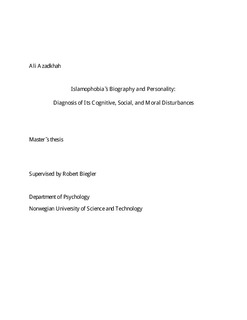| dc.description.abstract | This thesis investigates Islamophobia as a negative attitude toward Muslims. Differentiating between Islamophobia and Muslimophobia, the phenomenon in Europe and the U.S. is reviewed. Cognitive and social underpinnings of Islamophobia and how it can partially be related to cognitive and social biases are discussed. The alliance detection system explains categorization of Muslims based on coalitional computations. The Moral Foundations Theory is used to look into the evolutionary aspects of morality which are related to people’s attitudes toward others. Cognitive attitudes of 109 individuals toward Muslims in Norway were experimentally studied. Using backward stepwise regression procedure, participants’ age, sex, religion, moral foundations, and their sensitivity to salience of Muslim identity in text were analyzed. Results show that there is not a significant difference between non-Muslims’ and Muslims’ cognitive attitudes toward Muslims suggesting that perceived group membership does not essentially lead to holding more positive attitude toward ingroups. The moral foundation Sanctity/degradation significantly predicts negative attitude toward Muslims suggesting that those who care more about purity are more likely to be prejudiced against others, be them perceived ingroups or outgroups. Salience of Muslim identity had no significant effect on the cognitive attitude toward Muslims implying that stereotypes may be too rigid to be affected by manipulations through a single textual story. Religion significantly interacts with Loyalty/betrayal, and with Fairness/cheating in predicting cognitive attitude toward Muslims. The interactions indicate that non-Muslims’ cognitive attitude toward Muslims is less sensitive to Loyalty/betrayal and Fairness/cheating, while Muslims’ cognitive attitude is more dependent on these two moral foundations. This study is important because it looks into Islamophobia through new lenses. It provides insights for better understanding and predicting Muslim and non-Muslim individuals’ attitudes toward Muslims. | nb_NO |
